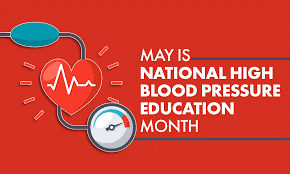
What is blood pressure?
Blood pressure is the pressure of blood pushing against the walls of your arteries. Arteries carry blood from your heart to other parts of your body. Your blood pressure normally rises and falls throughout the day.
What do blood pressure numbers mean?
Blood pressure is measured using two numbers:
The first number, called systolic blood pressure, measures the pressure in your arteries when your heart beats.
The second number, called diastolic blood pressure, measures the pressure in your arteries when your heart rests between beats.
If the measurement reads 120 systolic and 80 diastolic, you would say, "120 over 80," or write, "120/80 mmHg."
What are normal blood pressure numbers?
A normal blood pressure level is less than 120/80 mmHg.
No matter your age, you can take steps each day to keep your blood pressure in a healthy range.
What is high blood pressure (hypertension)?
High blood pressure, also called hypertension, is blood pressure that is higher than normal. Your blood pressure changes throughout the day based on your activities. Having blood pressure measures consistently above normal may result in a diagnosis of high blood pressure (or hypertension).
The higher your blood pressure levels, the more risk you have for other health problems, such as heart disease, heart attack, and stroke.
Your health care team can diagnose high blood pressure and make treatment decisions by reviewing your systolic and diastolic blood pressure levels and comparing them to levels found in certain guidelines.
What are the signs and symptoms of high blood pressure?
High blood pressure usually has no warning signs or symptoms, and many people do not know they have it. Measuring your blood pressure is the only way to know whether you have high blood pressure.
What causes high blood pressure?
High blood pressure usually develops over time. It can happen because of unhealthy lifestyle choices, such as not getting enough regular physical activity. Certain health conditions, such as diabetes and having obesity, can also increase the risk for developing high blood pressure. High blood pressure can also happen during pregnancy.
What problems does high blood pressure cause?
High blood pressure can damage your health in many ways. It can seriously hurt important organs like your heart, brain, kidneys, and eyes.
The good news is that, in most cases, you can manage your blood pressure to lower your risk for serious health problems.
Heart Attack and Heart Disease
High blood pressure can damage your arteries by making them less elastic, which decreases the flow of blood and oxygen to your heart and leads to heart disease. In addition, decreased blood flow to the heart can cause:
- Chest pain, also called angina.
- Heart attack, which happens when the blood supply to your heart is blocked and heart muscle begins to die without enough oxygen. The longer the blood flow is blocked, the greater the damage to the heart.
- Heart failure, a condition that means your heart can’t pump enough blood and oxygen to your other organs.
Hypertension Resources
Many resources are available for health professionals to support hypertension prevention and management and educate others. To support that effort, CDC’s Division for Heart Disease and Stroke Prevention has put together the following sets of educational materials for health care professionals and patients.
Visit Million Hearts® for more resources designed for health professionals. Million Hearts® is a national initiative co-led by CDC and the Centers for Medicare & Medicaid Services (CMS). Million Hearts® aims to prevent 1 million heart attacks and strokes within 5 years.
https://www.cdc.gov/bloodpressure/educational_materials.htm